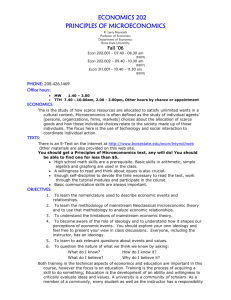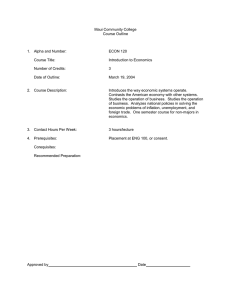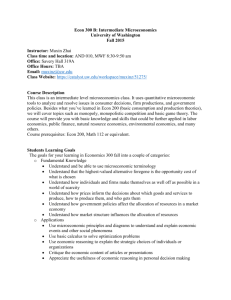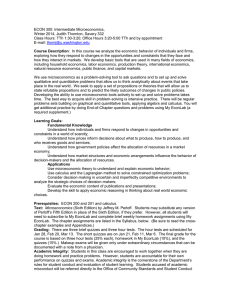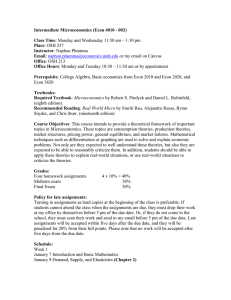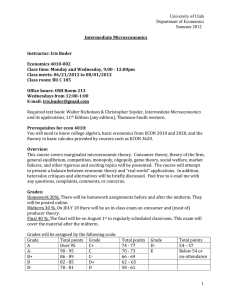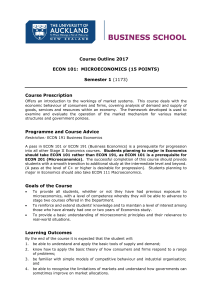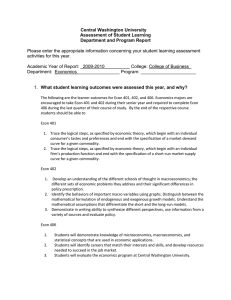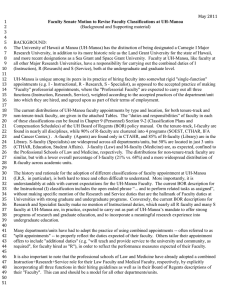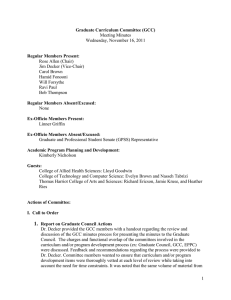Maui Community College Course Outline 1. Alpha and Number:
advertisement
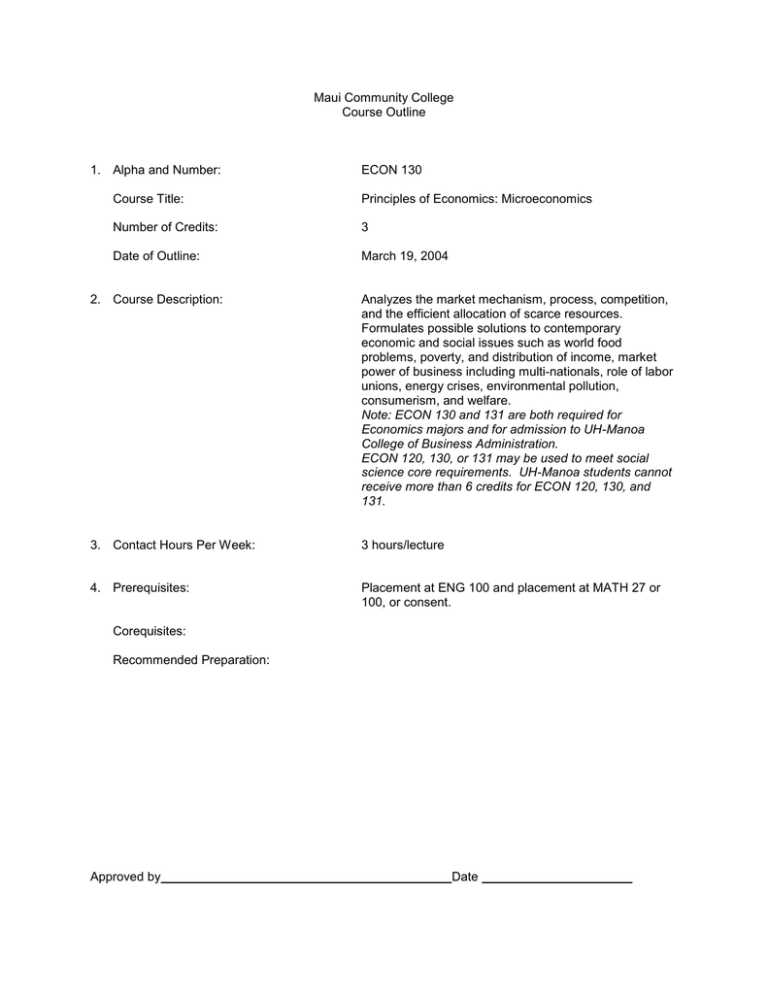
Maui Community College Course Outline 1. Alpha and Number: ECON 130 Course Title: Principles of Economics: Microeconomics Number of Credits: 3 Date of Outline: March 19, 2004 2. Course Description: Analyzes the market mechanism, process, competition, and the efficient allocation of scarce resources. Formulates possible solutions to contemporary economic and social issues such as world food problems, poverty, and distribution of income, market power of business including multi-nationals, role of labor unions, energy crises, environmental pollution, consumerism, and welfare. Note: ECON 130 and 131 are both required for Economics majors and for admission to UH-Manoa College of Business Administration. ECON 120, 130, or 131 may be used to meet social science core requirements. UH-Manoa students cannot receive more than 6 credits for ECON 120, 130, and 131. 3. Contact Hours Per Week: 3 hours/lecture 4. Prerequisites: Placement at ENG 100 and placement at MATH 27 or 100, or consent. Corequisites: Recommended Preparation: Approved by Date 5. General Course Objectives: Students should come away from the course with a better understanding of how the United States Economy operates. This knowledge should allow them to become better-informed consumers and more effective participants in the labor market. 6. Student Learning Outcomes: For assessment purposes, these are linked to #7. Recommended Course Content. On successful completion of this course, students will be able to: a. b. c. d. e. f. g. h. i. j. demonstrate an understanding of the market mechanism, forces of supply & demand; predict price changes based upon changes in supply & demand; analyze local retail markets: competition, pricing and market share; interpret graphs and tables of data; identify high demand career paths by watching economic trends; recognize the pros and cons of minimum wage legislation; reflect upon how you use economic decision making skills in their everyday transactions; relate economics to environmental issues; participate effectively in small group discussion; interpret and evaluate radio, television, and written news about the local and national economy. 7. Recommended Course Content and Approximate Time Spent on Each Topic Linked to #6. Student Learning Outcomes 1 – 2 Weeks: Scarcity, Choices and the Production Possibility Frontier (d, g, i, j) 1 - 2 Weeks: Market mechanism, supply & demand, pricing (a, b, d, g, i, j) 3 - 4 Weeks: Market Structures: Monopoly, Oligopoly, Monopolistic Competition, and Perfect Competition. (a, c, d, g. i, j) 2 – 3 Weeks: Labor Markets, Unions and Income distribution (d, e, f, g, i, j) 1 –2 Weeks: Environmental issues, dealing with pollution in a market economy (d, h, i, j) 8. Text and Materials: Appropriate text(s) and materials will be chosen at the time the course is to be offered from those currently available in the field. Examples include: Text: Principles of Microeconomics, by Karl E. Case and Ray C. Fair. 6 th edition. Materials: Handouts provided by instructor Videotapes viewed in class Companion Internet sites that go with the textbook Other instructional aids 9. Recommended Course and Evaluation: Specific course requirements are at the discretion of the instructor at the time the course is being offered. Suggested requirements might include, but are not limited to: Attendance and participation Written assignments from the book and current news media In-class exercises/assignments Graphing and mathematical problems Assignments using the Internet Written examinations Evaluation and Grading: Grading: Two Unit Exams One final Exam Homework Course grade: 90 – 100% 80 – 89% 70 – 79% 60 – 69% Below 60% 75 points each 75 points 125 points total A B C D F 10. Method of Instruction: Instructional methods will vary considerably with instructors. Specific methods will be at the discretion of the instructor teaching the course and might include, but are not limited to: a. b. c. d. e. f. g. h. i. j. Powerpoint slide overview textbook reading assignment mention of Hot Topics to explore in the news homework assignments live lecture group discussions videos shown in class to get the most out of class students need to come prepared, this implies having read the chapter to be discussed and having listened to the news on radio or television, or having read the local paper there will be ongoing discussions of current events and how they pertain to economics some of the homework will be completed during class time in small groups.

